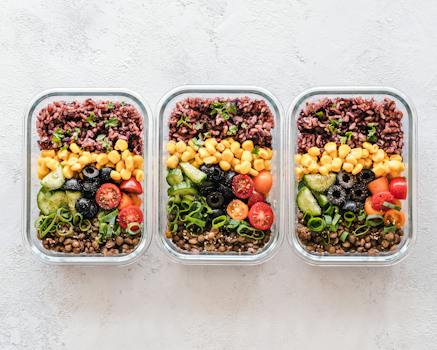
Clean eating is not just a trendy buzzword in the world of nutrition. It is a lifestyle choice that can have a profound impact on our overall health, with a particular focus on improving digestion. By adopting a clean eating approach, we prioritize whole, unprocessed foods that are rich in nutrients and free from additives and artificial ingredients. This article explores how clean eating can serve as a pathway to optimal digestion, helping to alleviate digestive issues, enhance nutrient absorption, and promote a healthy gut microbiome.
- 1. Introduction
- 2. Foods to Include in Your Clean Eating Diet
- 2.1. Fresh fruits and vegetables
- 2.2. Whole grains
- 2.3. Lean proteins
- 2.4. Healthy fats
- 2.5. Probiotic-rich foods
- 3. Foods to Avoid for Better Digestion
1. Introduction
Clean eating is a concept that emphasizes consuming whole, unprocessed foods that are free from artificial additives and chemicals. It is a dietary approach that focuses on nourishing the body with nutrient-dense foods, while avoiding processed and refined products. The goal of clean eating is to optimize digestion by providing the body with the necessary nutrients and supporting its natural detoxification processes. By choosing wholesome foods and adopting healthy eating habits, clean eating can contribute to improved digestion, increased energy levels, and overall well-being.
1.1. What is clean eating?
Clean eating is a dietary approach that focuses on consuming whole, unprocessed foods while avoiding processed and refined foods. It emphasizes the consumption of nutrient-dense foods such as fruits, vegetables, lean proteins, whole grains, and healthy fats. Clean eating also involves minimizing the intake of added sugars, artificial ingredients, and preservatives. By following a clean eating lifestyle, individuals aim to improve their overall health, enhance digestion, and support optimal well-being.
1.2. Benefits of clean eating
Clean eating refers to a dietary approach that focuses on consuming whole, unprocessed foods while avoiding refined and heavily processed ones. This practice has gained popularity in recent years as people are becoming more health-conscious and seeking ways to improve their overall well-being. Clean eating not only promotes optimal digestion but also offers several other benefits for a healthier lifestyle.
Firstly, by adopting a clean eating lifestyle, individuals can ensure that they are consuming a wide variety of nutrients. Whole foods such as fruits, vegetables, lean proteins, and whole grains are rich in vitamins, minerals, and antioxidants that support proper digestion and overall bodily functions.
Secondly, clean eating can help maintain a healthy weight. By avoiding processed foods that are often high in added sugars, unhealthy fats, and artificial additives, individuals can reduce their calorie intake and improve their body composition. This, in turn, can contribute to better digestion and prevent digestive issues such as bloating and constipation.
Thirdly, clean eating can boost energy levels and enhance mental clarity. Processed foods, especially those high in sugar and unhealthy fats, can lead to energy crashes and brain fog. On the other hand, clean eating provides the body with sustained energy by fueling it with nutrient-dense foods. This can result in increased productivity, improved focus, and overall mental well-being.
Furthermore, clean eating can support a strong immune system. Whole foods are packed with immune-boosting nutrients, such as vitamins C, D, and E, as well as zinc and selenium. By consuming these foods regularly, individuals can strengthen their immune response, reduce the risk of infections, and promote faster recovery from illnesses.
Lastly, clean eating can positively impact skin health. Processed foods and those high in refined sugars have been linked to skin issues such as acne, inflammation, and premature aging. By replacing these foods with clean and whole options, individuals can experience clearer, healthier, and more radiant skin.
In conclusion, clean eating offers numerous benefits for optimal digestion and overall well-being. By focusing on whole, unprocessed foods and avoiding heavily processed options, individuals can improve their nutrient intake, maintain a healthy weight, boost energy levels, support their immune system, and enhance their skin health. Incorporating clean eating principles into one’s lifestyle can pave the way to a healthier and more vibrant life.
1.3. The importance of digestion
Digestion plays a crucial role in our overall health and well-being. It is the process by which our body breaks down food into nutrients that can be absorbed and utilized. Optimal digestion is essential for proper nutrient absorption, energy production, and elimination of waste. Without a healthy digestive system, we may experience various health issues such as bloating, constipation, diarrhea, and nutrient deficiencies. In this article, we will explore the importance of digestion and how clean eating can help improve our digestive health.
2. Foods to Include in Your Clean Eating Diet
Clean eating is a popular approach to nutrition that focuses on consuming whole, unprocessed foods. By following a clean eating diet, you can improve your digestive health and overall well-being. Including certain foods in your clean eating diet can further enhance your digestion. Here are some foods to include in your clean eating diet:
1. Fiber-rich fruits and vegetables: Incorporate a variety of fiber-rich fruits and vegetables into your meals. These include apples, berries, broccoli, kale, and spinach. Fiber helps promote regular bowel movements and keeps your digestive system functioning optimally.
2. Whole grains: Opt for whole grains like quinoa, brown rice, and whole wheat bread instead of refined grains. These provide essential nutrients and fiber that aid in digestion.
3. Lean proteins: Include lean proteins such as chicken, turkey, fish, and tofu in your diet. These are easier to digest compared to fatty meats and provide necessary amino acids for optimal digestion.
4. Probiotic-rich foods: Probiotics are beneficial bacteria that support gut health. Incorporate foods like yogurt, kefir, sauerkraut, and kimchi into your clean eating diet to promote a healthy balance of gut bacteria.
5. Healthy fats: Include sources of healthy fats such as avocados, nuts, and olive oil in your diet. These fats help lubricate the digestive system and aid in the absorption of fat-soluble vitamins.
By including these foods in your clean eating diet, you can support optimal digestion and improve your overall health.
2.1. Fresh fruits and vegetables
Fresh fruits and vegetables are essential components of a clean eating diet. Packed with nutrients, vitamins, and minerals, these natural foods provide the body with the fuel it needs to function optimally. Incorporating a variety of fresh fruits and vegetables into your meals can support digestion and promote overall health. Colorful options such as berries, leafy greens, citrus fruits, and cruciferous vegetables are particularly beneficial due to their high fiber content and antioxidant properties. Including a wide range of fresh fruits and vegetables in your clean eating plan can help cleanse and detoxify the body, while also providing a delicious and satisfying dining experience.
2.2. Whole grains
Whole grains are an essential component of a clean eating diet that promotes optimal digestion. These grains are rich in fiber, vitamins, and minerals, providing a nourishing and wholesome addition to your meals. Incorporating whole grains into your diet can help regulate digestion, prevent constipation, and maintain a healthy weight.
Whole grains include options like quinoa, brown rice, oats, barley, and whole wheat. These grains are unprocessed and contain all parts of the grain, including the bran, germ, and endosperm. This means they retain their natural fiber content, essential nutrients, and antioxidants.
The fiber in whole grains aids in maintaining regular bowel movements and preventing digestive issues such as bloating and gas. It also helps lower cholesterol levels and reduce the risk of heart disease. The vitamins and minerals found in whole grains, such as B vitamins and magnesium, support overall digestive health.
To incorporate whole grains into your clean eating diet, replace refined grains like white rice and pasta with their whole grain counterparts. Choose whole grain bread, cereals, and crackers instead of processed options. Experiment with different grains to add variety to your meals and enjoy the numerous benefits they offer for digestion and overall well-being.
2.3. Lean proteins
Lean proteins are an essential component of a clean eating diet. They provide the body with the necessary amino acids to support muscle growth and repair. Incorporating lean proteins into your meals can help you feel fuller for longer and maintain stable energy levels throughout the day.
Some excellent sources of lean proteins include skinless chicken breast, turkey breast, fish, tofu, Greek yogurt, and legumes such as lentils and chickpeas. These options are low in saturated fats and high in nutrients, making them ideal for promoting optimal digestion.
Including lean proteins in your clean eating diet can also help with weight management and support overall wellness. By choosing lean proteins, you can reduce your intake of unhealthy fats and processed meats, which are known to contribute to digestive problems and other health issues.
Remember to prepare your lean proteins using healthy cooking methods such as grilling, baking, or steaming. Avoid deep-frying or adding excessive oils and sauces, as these can negate the benefits of the lean protein.
In conclusion, incorporating lean proteins into your clean eating diet is a great way to optimize digestion and support overall health. Make sure to include a variety of lean protein sources in your meals to maximize the nutritional benefits.
2.4. Healthy fats
When it comes to clean eating, incorporating healthy fats into your diet is essential for optimal digestion. Healthy fats are a crucial component of a balanced diet as they provide numerous health benefits. Including these fats in your clean eating plan can help improve digestion and overall well-being.
Avocados are a great source of healthy fats that promote optimal digestion. They are rich in monounsaturated fats, which can help lower cholesterol levels and reduce inflammation in the body. Additionally, avocados are packed with fiber, which aids in proper digestion and prevents constipation.
Another excellent source of healthy fats for a clean eating diet is nuts and seeds. They are loaded with omega-3 fatty acids, which have been shown to reduce inflammation and support a healthy digestive system. Almonds, walnuts, chia seeds, and flaxseeds are all great options to include in your diet.
Olive oil is a staple in many clean eating diets due to its numerous health benefits. It contains monounsaturated fats that can help improve digestion and reduce the risk of heart disease. Use olive oil as a dressing for salads or as a cooking oil to reap its benefits.
Fatty fish, such as salmon, mackerel, and sardines, are rich in omega-3 fatty acids. These healthy fats can help reduce inflammation in the gut and promote optimal digestion. Including fatty fish in your clean eating diet can also provide essential nutrients like vitamin D and selenium.
In conclusion, incorporating healthy fats into your clean eating diet is crucial for optimal digestion and overall well-being. Avocados, nuts and seeds, olive oil, and fatty fish are all excellent choices to include in your diet to promote a healthy digestive system.
2.5. Probiotic-rich foods
Probiotic-rich foods are a crucial component of a clean eating diet that promotes optimal digestion. These foods are abundant in beneficial bacteria that help maintain a healthy gut and support overall digestive health. Including probiotic-rich foods in your daily meals can help improve nutrient absorption, boost immunity, and even enhance mental well-being.
Some of the best probiotic-rich foods to include in your clean eating diet are:
1. Yogurt: A popular and easily accessible source of probiotics, yogurt contains live cultures of bacteria that aid digestion. Opt for plain, unsweetened yogurt without added artificial sweeteners or flavors.
2. Kefir: Similar to yogurt, kefir is a fermented dairy product that is rich in probiotics. It is also a good source of calcium and protein.
3. Sauerkraut: Made from fermented cabbage, sauerkraut is packed with probiotics and is a great addition to salads, sandwiches, or even as a side dish.
4. Kimchi: A traditional Korean dish, kimchi is made from fermented vegetables such as cabbage and radishes. It is not only rich in probiotics but also provides a good amount of vitamins and minerals.
5. Kombucha: This fermented tea is gaining popularity for its probiotic content. It is a refreshing and fizzy beverage that can be enjoyed as an alternative to sugary drinks.
Including these probiotic-rich foods in your clean eating diet can contribute to a healthy gut and improved digestion. Experiment with different options to find what works best for you and enjoy the benefits of a well-nourished digestive system.
3. Foods to Avoid for Better Digestion
When it comes to clean eating and optimizing digestion, it is important to be mindful of the foods we consume. Certain foods can be detrimental to our digestive system and hinder its ability to function properly. Here are some foods that should be avoided for better digestion:
1. Processed Foods: Highly processed foods are often loaded with artificial ingredients, preservatives, and unhealthy fats. These substances can irritate the digestive tract and lead to bloating, discomfort, and irregular bowel movements.
2. Fried Foods: Foods that are fried in unhealthy oils can be difficult for the body to digest. They are often high in saturated fats and can slow down the digestive process, causing indigestion and heartburn.
3. Spicy Foods: While some people may tolerate spicy foods well, others may experience digestive issues after consuming them. Spicy foods can trigger acid reflux, stomach pain, and diarrhea in sensitive individuals.
4. Carbonated Drinks: Carbonated beverages, such as soda and sparkling water, can lead to bloating and gas. The bubbles in these drinks can increase pressure in the digestive system, causing discomfort and belching.
5. Artificial Sweeteners: Artificial sweeteners, commonly found in diet sodas and sugar-free products, can disrupt the balance of gut bacteria. This can result in digestive problems, such as gas, diarrhea, and abdominal pain.
By avoiding these foods and opting for whole, unprocessed foods, you can support optimal digestion and promote overall gut health.
3.1. Processed and packaged foods
Processed and packaged foods are notorious for their negative impact on digestion. These types of foods are often loaded with preservatives, artificial ingredients, unhealthy fats, and excessive amounts of salt and sugar. Consuming these foods regularly can lead to a host of digestive issues, including bloating, gas, indigestion, and constipation.
One of the main reasons why processed and packaged foods are difficult to digest is because they lack essential nutrients and fiber. These foods are often stripped of their natural fiber content during the processing and packaging phase, making them less beneficial for digestion.
Additionally, processed and packaged foods are typically high in unhealthy fats, such as trans fats and saturated fats. These fats can slow down the digestive process and increase the risk of inflammation in the digestive system.
Furthermore, many processed and packaged foods contain artificial ingredients and preservatives that can irritate the digestive system. These additives are often used to enhance flavor, texture, and shelf life, but they can disrupt the natural balance of the gut and lead to digestive discomfort.
To optimize digestion and promote overall health, it is best to avoid or minimize the consumption of processed and packaged foods. Instead, focus on incorporating whole, unprocessed foods into your diet. These include fresh fruits and vegetables, lean proteins, whole grains, and healthy fats. By making this shift towards clean eating, you can support optimal digestion and improve your overall well-being.
3.2. Added sugars and sweeteners
Added sugars and sweeteners are some of the top foods to avoid for better digestion. These substances are commonly found in processed foods, sugary drinks, desserts, and many other unhealthy snacks. Consuming excessive amounts of added sugars can lead to a variety of digestive issues, including bloating, gas, and indigestion.
When we consume foods high in added sugars, such as sodas or candies, the body struggles to break them down properly. This can disrupt the natural balance of bacteria in the gut and contribute to the growth of harmful bacteria. Additionally, added sugars can cause inflammation in the digestive system, leading to discomfort and even more severe conditions like irritable bowel syndrome (IBS).
Furthermore, artificial sweeteners, often used as a sugar substitute in diet products, can also have a negative impact on digestion. While they may have fewer calories, these sweeteners can still cause digestive distress, such as diarrhea or abdominal pain, in some individuals.
To improve digestion and promote a healthier gut, it is best to avoid or limit foods and beverages that contain added sugars and artificial sweeteners. Instead, opt for natural sweeteners like honey or maple syrup in moderation, and focus on a diet rich in whole foods, fruits, vegetables, lean proteins, and whole grains.
3.3. Artificial additives and preservatives
Artificial additives and preservatives are commonly found in processed foods, and they can have a negative impact on digestion. These additives are often used to enhance flavor, extend shelf life, and improve the appearance of food products. However, many of them can disrupt the natural digestive process and cause various digestive issues.
One common artificial additive to avoid is monosodium glutamate (MSG), which is commonly used as a flavor enhancer. MSG has been linked to symptoms such as headaches, nausea, and bloating in some individuals. It can also overstimulate certain receptors in the brain and disrupt the normal functioning of the digestive system.
Another additive to be cautious of is artificial sweeteners, such as aspartame and sucralose. While they may seem like a healthier alternative to sugar, they can actually have a negative impact on digestion. Artificial sweeteners are known to alter gut bacteria, leading to digestive problems like bloating, gas, and diarrhea.
Preservatives are another category of additives that can affect digestion. Sodium nitrate, for example, is commonly used in processed meats to prevent bacterial growth and enhance the color of the products. However, it has been associated with an increased risk of digestive disorders, including stomach cancer. Other preservatives like butylated hydroxyanisole (BHA) and butylated hydroxytoluene (BHT) have also been linked to digestive issues.
To improve digestion and promote optimal health, it is important to avoid foods that contain artificial additives and preservatives. Instead, opt for whole, unprocessed foods that are free from these harmful substances. By choosing clean, natural foods, you can support your digestive system and maintain better overall health.
3.4. High-fat and fried foods
High-fat and fried foods are commonly known to be detrimental to digestion. These types of foods can slow down the digestive process and increase the risk of digestive issues such as bloating, indigestion, and heartburn. The high fat content in these foods requires more effort from the digestive system to break them down, leading to a longer digestion time. Additionally, fried foods are often cooked in unhealthy oils that can further irritate the digestive system and cause discomfort. To promote optimal digestion, it is advisable to avoid or limit the consumption of high-fat and fried foods. Instead, focus on incorporating more nutrient-dense, whole foods into your diet that are easier to digest and provide essential vitamins and minerals for overall digestive health.
3.5. Excessive caffeine and alcohol
Excessive consumption of caffeine and alcohol can have a negative impact on digestion. Both substances can irritate the gastrointestinal tract and disrupt the normal functioning of the digestive system.
Caffeine, found in coffee, tea, energy drinks, and some sodas, is a stimulant that can increase stomach acid production. This excess acid can cause heartburn, acid reflux, and stomach ulcers. Additionally, caffeine acts as a diuretic, which can lead to dehydration and constipation if not balanced with adequate water intake.
Alcohol, on the other hand, can irritate the lining of the stomach and intestines, leading to inflammation and digestive discomfort. It can also impair the production of digestive enzymes and reduce nutrient absorption. Excessive alcohol consumption is often associated with conditions like gastritis, pancreatitis, and liver disease, which can further harm the digestive system.
To promote optimal digestion, it is advisable to limit the intake of caffeine and alcohol. Instead, opt for hydrating beverages like water and herbal teas, and choose non-alcoholic options when socializing. By avoiding excessive caffeine and alcohol consumption, you can support a healthier digestive system and overall well-being.
Conclusion
In conclusion, adopting a clean eating lifestyle can be a powerful pathway to achieving optimal digestion. By focusing on whole, unprocessed foods and avoiding artificial additives, individuals can support their digestive system and enhance their overall health. Clean eating promotes the consumption of nourishing foods that are rich in nutrients and enzymes, which can aid in digestion and absorption. Additionally, this approach encourages mindful eating and portion control, further contributing to improved digestion. Embracing clean eating as a long-term dietary choice can lead to a healthier gut and a happier, more vibrant life.


